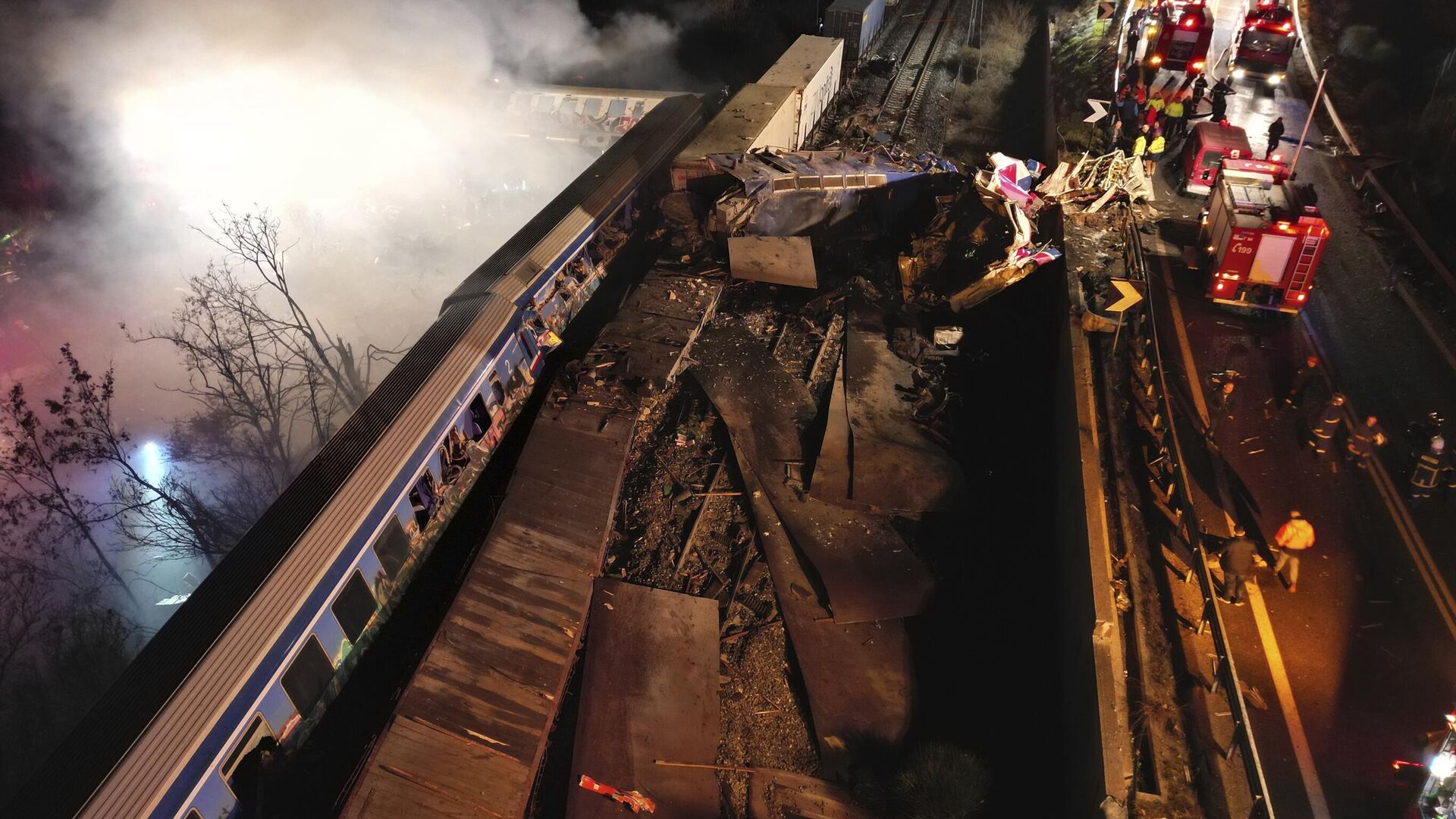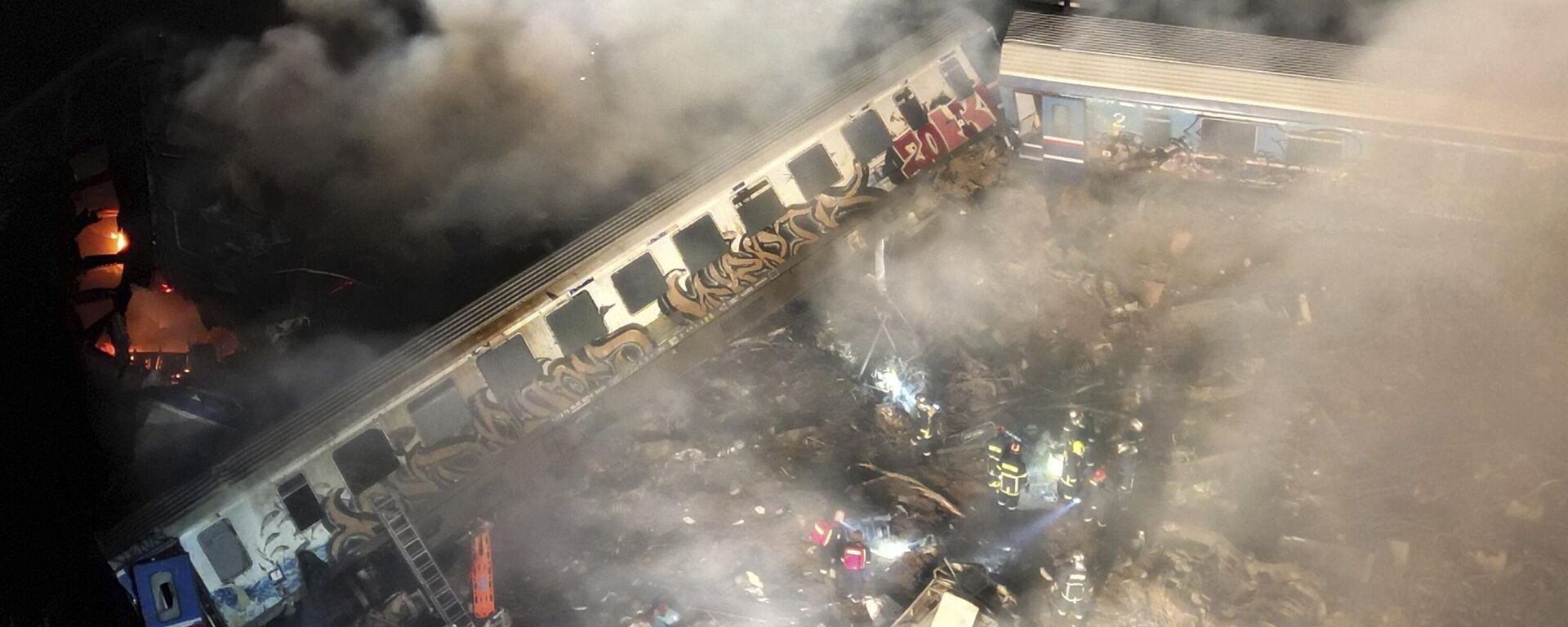https://sputnikglobe.com/20230318/greeks-bemoan-aging-infrastructure-maintenance-issues-in-wake-of-deadly-train-crash-1108527314.html
Greeks Bemoan Aging Infrastructure, Maintenance Issues in Wake of Deadly Train Crash
Greeks Bemoan Aging Infrastructure, Maintenance Issues in Wake of Deadly Train Crash
Sputnik International
Greek citizens blame aging public infrastructure, lackluster maintenance and staff cuts as well as EU-imposed austerity policies for the recent train collision that killed nearly 60 people
2023-03-18T06:23+0000
2023-03-18T06:23+0000
2023-03-18T06:23+0000
world
greece
train crash
railroad
https://cdn1.img.sputnikglobe.com/img/07e7/03/01/1107886623_0:257:2731:1793_1920x0_80_0_0_7d435c63ec9248f102daa7a92907f8da.jpg
"Greece has the worse rail network in Europe. The EU has invested hundreds of millions of euros in this field and the rail infrastructure in Greece is as it was 20 years ago, everything works based on verbal interaction between interlocutors when it comes to the rail traffic regulations, there is not even a GPS system to track the trains online like it is in other European countries," Aggeliki, a 34-year-old civil engineer from Crete, explained, while also expressing her anger with the Greek government, which she accuses of not investing in safety systems. She also noted that infrastructure in the areas that are popular with tourists is maintained, while other parts of the country aren't as lucky in that regard despite infrastructure investments from the European Union. This sentiment was echoed by 32-year-old lawyer Nikos, who also drew attention to the fact that "in some other areas public infrastructure is as it was in the sixties, unchanged and this is not something that is acceptable, especially for a country with 13 million visitors per year like Greece is." He also suggested there were signs that the EU funds had been mismanaged for years and it was evident in people's daily life. Meanwhile, 56-year-old Cretan bus driver Manolis suggested that the Greek economic crisis played a role, blaming the EU-imposed austerity policies rather than the government for the recent tragedy. He also cited his own experience as a transportation worker, describing the state of the country's infrastructure. "The quality of the asphalt [on the roads] is getting worse and worse and they don't maintain anything properly when it comes to road network anymore. It is only by the fact that people like me and other professionals working in transportation giving our best effort that we don't have more accidents in other fields as well, and this decline started in 2010 with the economic crisis and it hasn't changed since then," Manolis suggested. A retired employee of Hellenic Train S.A. who preferred to remain anonymous recounted that in 2011 and 2012, the company had to lay off many employees, thus doubling the number of daily tasks for the staff that remained. At the same time, the former employee remembered regular training for employees as well as high safety standards during their tenure. On March 1, a passenger train collided with a freight train near the Greek city of Larissa. The passenger train had switched to the freight train's lane before the accident, which brought them both on the same track and resulted in a deadly head-on collision. The head of Larissa station was arrested. According to media reports, he admitted his guilt and said that he had mistakenly sent a passenger train along the wrong track. Railroad workers, in turn, talked about chronic safety issues that the authorities have been ignoring for years. The Greek government has vowed to fully investigate the causes of the disaster.
https://sputnikglobe.com/20230309/greek-prime-minister-assumes-personal-responsibility-for-deadly-train-crash-1108215157.html
greece
Sputnik International
feedback@sputniknews.com
+74956456601
MIA „Rossiya Segodnya“
2023
Sputnik International
feedback@sputniknews.com
+74956456601
MIA „Rossiya Segodnya“
News
en_EN
Sputnik International
feedback@sputniknews.com
+74956456601
MIA „Rossiya Segodnya“
Sputnik International
feedback@sputniknews.com
+74956456601
MIA „Rossiya Segodnya“
greek citizens blame aging public infrastructure, train collision, lackluster maintenance
greek citizens blame aging public infrastructure, train collision, lackluster maintenance
Greeks Bemoan Aging Infrastructure, Maintenance Issues in Wake of Deadly Train Crash
ATHENS (Sputnik) - Greek citizens blame aging public infrastructure, lackluster maintenance and staff cuts as well as EU-imposed austerity policies for the recent train collision that killed nearly 60 people, according to the people surveyed by Sputnik.
"Greece has the worse rail network in Europe. The EU has invested hundreds of millions of euros in this field and the rail infrastructure in Greece is as it was 20 years ago, everything works based on verbal interaction between interlocutors when it comes to the rail traffic regulations, there is not even a GPS system to track the trains online like it is in other European countries," Aggeliki, a 34-year-old civil engineer from Crete, explained, while also expressing her anger with the Greek government, which she accuses of not investing in
safety systems.
She also noted that infrastructure in the areas that are popular with tourists is maintained, while other parts of the country aren't as lucky in that regard despite infrastructure investments from the European Union. This sentiment was echoed by 32-year-old lawyer Nikos, who also drew attention to the fact that "in some other areas public infrastructure is as it was in the sixties, unchanged and this is not something that is acceptable, especially for a country with 13 million visitors per year like Greece is."
"I don't think that the level of public infrastructure in Greece is what it should have been for an EU member state. Greece became an EU member state in 1981, since then billions of euros have poured into the economy for infrastructure development, and yet you still see that there are some aspects of public infrastructure untouched and unchanged since the sixties," Nikos said.
He also suggested there were signs that the EU funds had been mismanaged for years and it was evident in people's daily life.
"You can see and read many times that the EU is funding infrastructure projects worth millions of euros in our country and in some cases we experience that, but as a total outcome, I would say that I don't think that the level of public infrastructure in Greece is what it should have been for an EU member state," Nikos observed.
Meanwhile, 56-year-old Cretan bus driver Manolis suggested that the Greek economic crisis played a role, blaming the EU-imposed austerity policies rather than the government for the recent tragedy. He also cited his own experience as a transportation worker, describing the state of the country's infrastructure.
"The quality of the asphalt [on the roads] is getting worse and worse and they don't maintain anything properly when it comes to road network anymore. It is only by the fact that people like me and other professionals working in transportation giving our best effort that we don't have more accidents in other fields as well, and this decline started in 2010 with the economic crisis and it hasn't changed since then," Manolis suggested.
A retired employee of Hellenic Train S.A. who preferred to remain anonymous recounted that in 2011 and 2012, the company had to lay off many employees, thus doubling the number of daily tasks for the staff that remained.
"However, to my knowledge, I can't say that there was any mismanagement or any sort of bad training for the employees, but the main problem ,at least in my view and in my experience, was the fact that many people were fired during this period and this brought adjustments to the remaining staff," the pensioner stated.
At the same time, the former employee remembered regular training for employees as well as high safety standards during their tenure.
On March 1, a
passenger train collided with a freight train near the Greek city of Larissa. The passenger train had switched to the freight train's lane before the accident, which brought them both on the same track and resulted in a deadly head-on collision. The head of Larissa station was arrested. According to media reports, he admitted his guilt and said that he had mistakenly sent a passenger train along the wrong track. Railroad workers, in turn, talked about chronic safety issues that the authorities have been ignoring for years. The Greek government has vowed to fully investigate the causes of the disaster.



